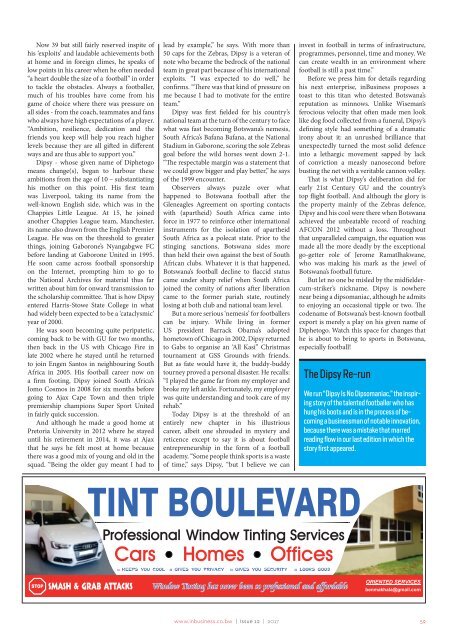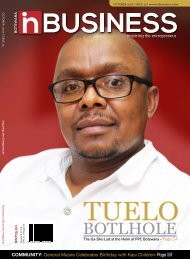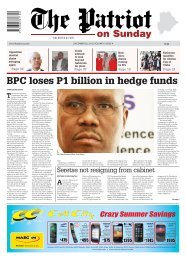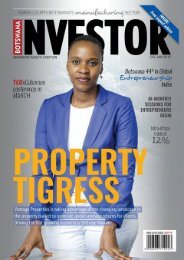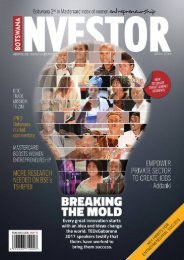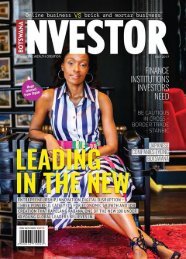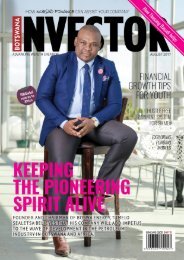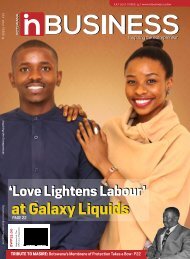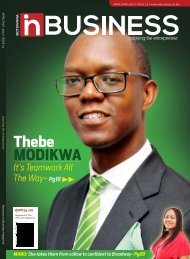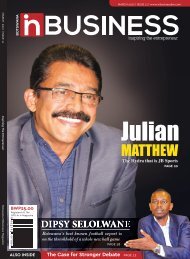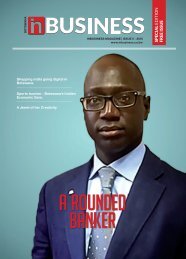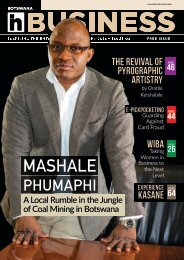inBUSINESS Issue 12
Create successful ePaper yourself
Turn your PDF publications into a flip-book with our unique Google optimized e-Paper software.
Now 39 but still fairly reserved inspite of<br />
his ‘exploits’ and laudable achievements both<br />
at home and in foreign climes, he speaks of<br />
low points in his career when he often needed<br />
“a heart double the size of a football” in order<br />
to tackle the obstacles. Always a footballer,<br />
much of his troubles have come from his<br />
game of choice where there was pressure on<br />
all sides - from the coach, teammates and fans<br />
who always have high expectations of a player.<br />
“Ambition, resilience, dedication and the<br />
friends you keep will help you reach higher<br />
levels because they are all gifted in different<br />
ways and are thus able to support you.”<br />
Dipsy - whose given name of Diphetogo<br />
means change(s), began to harbour these<br />
ambitions from the age of 10 – substantiating<br />
his mother on this point. His first team<br />
was Liverpool, taking its name from the<br />
well-known English side, which was in the<br />
Chappies Little League. At 15, he joined<br />
another Chappies League team, Manchester,<br />
its name also drawn from the English Premier<br />
League. He was on the threshold to greater<br />
things, joining Gaborone’s Nyangabgwe FC<br />
before landing at Gaborone United in 1995.<br />
He soon came across football sponsorship<br />
on the Internet, prompting him to go to<br />
the National Archives for material thus far<br />
written about him for onward transmission to<br />
the scholarship committee. That is how Dipsy<br />
entered Harris-Stowe State College in what<br />
had widely been expected to be a ‘cataclysmic’<br />
year of 2000.<br />
He was soon becoming quite peripatetic,<br />
coming back to be with GU for two months,<br />
then back in the US with Chicago Fire in<br />
late 2002 where he stayed until he returned<br />
to join Engen Santos in neighbouring South<br />
Africa in 2005. His football career now on<br />
a firm footing, Dipsy joined South Africa’s<br />
Jomo Cosmos in 2008 for six months before<br />
going to Ajax Cape Town and then triple<br />
premiership champions Super Sport United<br />
in fairly quick succession.<br />
And although he made a good home at<br />
Pretoria University in 20<strong>12</strong> where he stayed<br />
until his retirement in 2014, it was at Ajax<br />
that he says he felt most at home because<br />
there was a good mix of young and old in the<br />
squad. “Being the older guy meant I had to<br />
lead by example,” he says. With more than<br />
50 caps for the Zebras, Dipsy is a veteran of<br />
note who became the bedrock of the national<br />
team in great part because of his international<br />
exploits. “I was expected to do well,” he<br />
confirms. “There was that kind of pressure on<br />
me because I had to motivate for the entire<br />
team.”<br />
Dipsy was first fielded for his country’s<br />
national team at the turn of the century to face<br />
what was fast becoming Botswana’s nemesis,<br />
South Africa’s Bafana Bafana, at the National<br />
Stadium in Gaborone, scoring the sole Zebras<br />
goal before the wild horses went down 2-1.<br />
“The respectable margin was a statement that<br />
we could grow bigger and play better,” he says<br />
of the 1999 encounter.<br />
Observers always puzzle over what<br />
happened to Botswana football after the<br />
Gleneagles Agreement on sporting contacts<br />
with (apartheid) South Africa came into<br />
force in 1977 to reinforce other international<br />
instruments for the isolation of apartheid<br />
South Africa as a polecat state. Prior to the<br />
stinging sanctions, Botswana sides more<br />
than held their own against the best of South<br />
African clubs. Whatever it is that happened,<br />
Botswana’s football decline to flaccid status<br />
came under sharp relief when South Africa<br />
joined the comity of nations after liberation<br />
came to the former pariah state, routinely<br />
losing at both club and national team level.<br />
But a more serious ‘nemesis’ for footballers<br />
can be injury. While living in former<br />
US president Barrack Obama’s adopted<br />
hometown of Chicago in 2002, Dipsy returned<br />
to Gabs to organise an ‘All Kasi” Christmas<br />
tournament at GSS Grounds with friends.<br />
But as fate would have it, the buddy-buddy<br />
tourney proved a personal disaster. He recalls:<br />
“I played the game far from my employer and<br />
broke my left ankle. Fortunately, my employer<br />
was quite understanding and took care of my<br />
rehab.”<br />
Today Dipsy is at the threshold of an<br />
entirely new chapter in his illustrious<br />
career, albeit one shrouded in mystery and<br />
reticence except to say it is about football<br />
entrepreneurship in the form of a football<br />
academy. “Some people think sports is a waste<br />
of time,” says Dipsy, “but I believe we can<br />
invest in football in terms of infrastructure,<br />
programmes, personnel, time and money. We<br />
can create wealth in an environment where<br />
football is still a past time.”<br />
Before we press him for details regarding<br />
his next enterprise, inBusiness proposes a<br />
toast to this titan who detested Botswana’s<br />
reputation as minnows. Unlike Wiseman’s<br />
ferocious velocity that often made men look<br />
like dog food collected from a funeral, Dipsy’s<br />
defining style had something of a dramatic<br />
irony about it: an unrushed brilliance that<br />
unexpectedly turned the most solid defence<br />
into a lethargic movement sapped by lack<br />
of conviction a measly nanosecond before<br />
busting the net with a veritable cannon volley.<br />
That is what Dipsy’s deliberation did for<br />
early 21st Century GU and the country’s<br />
top flight football. And although the glory is<br />
the property mainly of the Zebras defence,<br />
Dipsy and his cool were there when Botswana<br />
achieved the unbeatable record of reaching<br />
AFCON 20<strong>12</strong> without a loss. Throughout<br />
that unparalleled campaign, the equation was<br />
made all the more deadly by the exceptional<br />
go-getter role of Jerome Ramatlhakwane,<br />
who was making his mark as the jewel of<br />
Botswana’s football future.<br />
But let no one be misled by the midfieldercum-striker’s<br />
nickname. Dipsy is nowhere<br />
near being a dipsomaniac, although he admits<br />
to enjoying an occasional tipple or two. The<br />
codename of Botswana’s best-known football<br />
export is merely a play on his given name of<br />
Diphetogo. Watch this space for changes that<br />
he is about to bring to sports in Botswana,<br />
especially football!<br />
The Dipsy Re-run<br />
We run “Dipsy Is No Dipsomaniac,” the inspiring<br />
story of the talented footballer who has<br />
hung his boots and is in the process of becoming<br />
a businessman of notable innovation,<br />
because there was a mistake that marred<br />
reading flow in our last edition in which the<br />
story first appeared.<br />
TINT BOULEVARD<br />
STOP<br />
ORIENTED SERVICES<br />
benmakhala@gmail.com<br />
www.inbusiness.co.bw | <strong>Issue</strong> <strong>12</strong> | 2017 59


